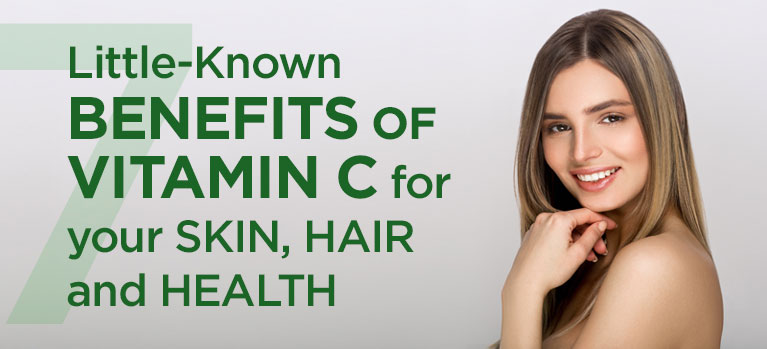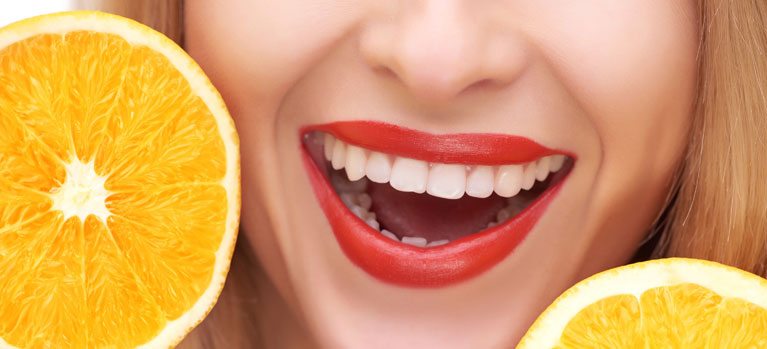Let’s paint a scenario. You wake up to the sound of your alarm reminding you that another day has reared its head, and unfortunately, yours is all foggy. Your nose is stuffed, you feel a fever coming on and nothing can motivate you to get out of bed—not even your favorite barista at the neighborhood coffee shop. You’re getting sick and your first thought (thanks to the nagging of your loving mother) is to load up on vitamin C to kick those germs to the curb, ASAP! This is a great go-to, but we’re sharing 7 little known benefits of vitamin C for skin, hair and health!
Along with improving and strengthening your immune system, vitamin C possesses some impressive benefits for many of the skin conditions you might be struggling with. “Vitamin C, also known as ascorbic acid, is a water-soluble vitamin that is an antioxidant that helps form and maintain connective tissue. An antioxidant helps capture free radical damage caused by oxidative stress or sun damage to the skin. It is also essential for collagen production.
So how exactly can this essential ingredient found in many skin care and hair care products help you?
1. Correct Dark Spots and Hyperpigmentation
Depending on the condition of your skin, how much time you spend in the sun and your ethnic background, you might have more dark spots than some of your peers. Though this is normal and part of the aging process, vitamin C can help to reverse the appearance of dark spots.
2. Block Free Radicals
Though basking in the sunlight feels great in the moment, any time you expose your skin to dangerous rays, you put yourself at risk for damage. In addition to wearing sunscreen, no matter how cloudy or bright it is, you should also use vitamin C.
3. Minimize Dryness and Wrinkles
Winter or not, you might find yourself struggling with dry skin patches or perpetually thirsty cells. No matter how much lotion or moisturizer you lather on, you still feel flaky, itchy or struggle with redness. That’s because you’re not focusing on a star ingredient that could make a difference, Vitamin C may be an important part of a moisturizer or serum, since it helps cells mature and differentiate normally.
4. Boost Collagen Production
While Botox and fillers are an extreme way to treat skin that loses its elasticity over time, another way to approach your routine is to consider the nutrients that naturally help your skin stay young. Vitamin C is essential to the development of new collagen in your skin. Therefore, without it, the skin will get thinner and less supple with age. In order to keep it available at all stages of collagen formation, it should be used topically as well as taken orally.
5. Repair Damaged Hair
You might not realize it, but our hair is impacted by our environment almost as much as our skin. Because the effects don’t instantly show up in a noticeable way, we forget about protecting it in a more deliberate way. Our hair is damaged by UV and pollution, as well as many other things we do to it, and vitamin C can help repair some of this damage the same way it helps skin repair.
6. Prevent Gum and Bone Disease
That glass of OJ (or packet of Emergen-C) that you take at the first sign of sickness might help give your immune system a boost, but it can also do more than just keep you from encountering coughing fits. Vitamin C helps to prevent gum disease and probably helps to keep bones healthy in a roundabout way through its assistance with collagen formation.
7. Fight Off Fatigue
In addition to all of the incredible benefits mentioned above, another perk of vitamin C is what it does for your mind and your overall mood. Being nutritionally balanced (that includes getting enough vitamin C) has been shown to improve overall cellular function and general health. This can lead to better quality of life in general. Several studies have also suggested that vitamin C improves mood but the mechanics of this is still unknown.










